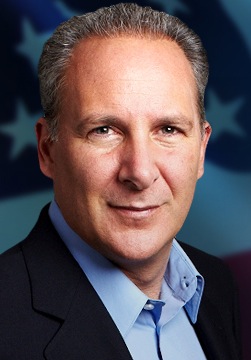Pay No Attention to the Man Behind the Curtain
In recent weeks, as the word "stagflation" has made a few appearances on the national media stage, many bullish skeptics, such as CNBC's Steve Liesman, have downplayed the current "mini" stagflation with contrasts to the "real" variety of the 1970's and early 1980's. Such confidence however fails to recognize that we now measure economic activity and inflation with very different yardsticks than we did when Disco Duck topped the charts and Jimmy Carter wore sweaters. In reality, changes in the methodologies mean that the statistics bear as much resemblance as an 8-track to an iPod, and only serve to obscure the genuine threat we now face.
In the 1970's and early 1980's, "core CPI" included housing prices, and the basket was neither altered to reflect substitutions (in which stuff that had gone up in price is replaced by stuff that did not), nor were prices hedonically adjusted (a 5% increase transformed into a 3% decrease based on a subjective assessment of quality improvement). Similarly, changes have hit GDP assessments. For instance, 25 years ago GDP was calculated using a more honest deflator; business fixed investment expenditures were not hedonically adjusted ($5 billion spent on computers recorded as $50 billion, as computing power increased by a factor of 10 over the benchmark year), and phantom payments were not included (imputed income on owner-occupied housing counted as rents, or free checking accounts recorded as interest payments).
In addition, comparisons using "core" inflation numbers, which was the case in Liesman's example, leave out energy prices, which have been particularly effected by the current round of inflation, and food, which in my opinion is about to follow in energy's footsteps. In fact, as I write this commentary, crude oil prices are up almost three dollars per barrel today alone, hitting a new record high just shy of $78 dollars a barrel. In the last five years, crude oil prices have risen more than four-fold, with no end to the rally anywhere in sight.
Over the years, the government has managed to "solve" economic problems merely by changing the way they are measured. By re-jiggering the manner in which CPI and GDP are calculated, the government misrepresents the true health of the economy, making it easier for incumbents to be re-elected. President Bush demonstrated this to perfection in his televised speech earlier this week. Despite a building sense among the population that the economy is shaky, the President was able to effectively say, "What are you complaining about, look how good you have it? Inflation is just 2.5% and the economy is growing at 4% per year. Why back in the seventies and eighties people had to struggle with 8% - 10% inflation and 1%- 2% growth." The reality is that today's generation is experiencing similar struggles.
Despite the rosy numbers, today the typical American family pays for groceries with a Visa card, utilities with a home equity loan, has a six-year loan on their SUV, has no savings, and has both parents working just to keep the family one-step ahead of its creditors. With all this supposed non-inflationary economic growth, why do Americans borrow to pay for everyday necessities which used to be easily financed from incomes, and why has a nation of savers been transformed into one of debtors?
From the government's perspective, all the misrepresentations are part of a giant confidence game that it meant to keep all the marks, most of them foreign, from wising up. A fiat-based monetary system only functions as long as confidence is maintained. The minute it's lost, the whole scheme implodes. Since confidence is the only thing holding up the U.S. dollar, and by extension the entire U.S. economy, maintaining that confidence is the government's highest priority. If elected officials and central bankers have to obfuscate a bit to do it, so be it.
Don't wait for the signs to appear. Protect your wealth and preserve you purchasing power before it's too late. Download my free research report on the powerful case for investing in foreign equities available atwww.researchreportone.com .

















